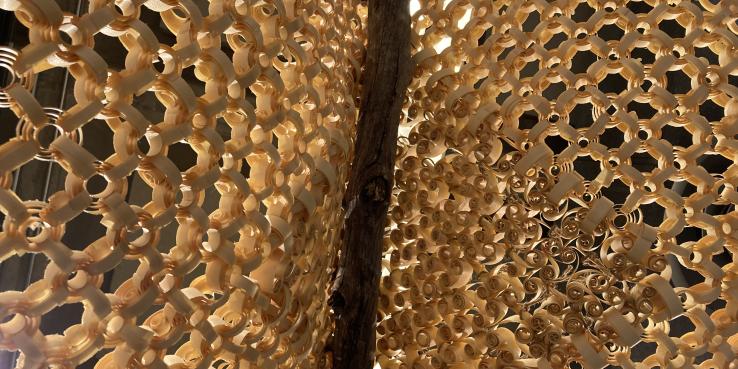Plants undergo various protocols that inhibit decomposition. Strategies can range from the secretion of plant resins to mineralization. Vegetal resin secretion is generated to protect from pathogens, including fungal deterioration, particularly in woody species. Dependent on the plant, protection mechanisms can also be accompanied by morphological changes in their tissue, producing encapsulation. Plants' unique material and structural defense strategies are multifold, spanning from resistance to microbial deterioration, harboring pathogens, to preventing water permeation. The MAAD studio inquires if defense strategies and intentional incorporation of bacteria and fungi in plant tissue, including woods, lead to unprecedented material functionalities in the built environment. Wood provides critical opportunities as a carbon sink material. Nevertheless, the environmental and factual carbon sink capacity of wood and wood products depends on various factors. Producing construction materials such as timber requires much energy to dry and process them. Concurrently, investing in the tree itself is only sometimes possible in an industry widely distributed among many small producers.
This situation raises questions about what and how we should build with wood and whether the wood industry will be radically transformed. Such interrogations require assessing wood across dimensional and production scales spanning from the science of the cell wall to architectural design, engineering, and global policies. This studio revolves around these interrogations in conceptual production models and strategic-making investigations of wood innovation. This is exercised through the design of a mid-twenty-first-century wood "circular factory." The program is open to interpreting the meaning of a wood "factory" from a broad range of approaches, from a centralized to a distributive bio-based circular economy. The context of Oroville, CA, encompasses the riverbank of the Feather River in Oroville, CA, which remains one of the few lumber industries in the west. California's beleaguered timber industry produces many problems, from the need to import over 80% of its wood products to its role in wildfires due to unmanaged forestation.
Consequently, rethinking the timber industry's role is vital for the region. The design investigation of a mid-twenty-first century "circular factory encompasses developing new concepts around wood technology and applications exploring innovation of systems, methods, organization, and material strategies specifically focused on increasing flooding and wildfire risks. The studio investigated the interdependency of wood innovation from master planning behavioral ecologies' AI models, tectonics, and robotics to material properties of combined wood waste byproducts, including oak bark and pine resin.

